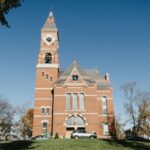Tuesday night’s meeting was all about housekeeping for the Water and Sewer Commission. At its monthly meeting, it looked at a range of topics as it headed into the new year, focused on preparing for the Town Meeting in May.
The meeting kicked off with a series of reports from the Superintendent Amy McHugh. She presented information on several leaks around town that were caught and repaired, reviewed flooding and seawall efficacy during the recent storms, and highlighted the need for employee licensing and training.
McHugh also stated that the Commission’s policy of shutting off water to residences that have not paid their bills after 270 days would be put back into place. She reported that the practice of putting pink tags on residences that have not paid their bills in 180 days was an effective reminder and decreased the number of unpaid bills.
Following the reports, the Commission reviewed a resident’s request to build an addition on a 40-foot easement. The proposed addition would extend the structure close to a 12-inch diameter clay pipe running four feet underground. After discussion with the resident’s legal council, the Commission unanimously passed the motion to build on the easement after further inspection. The request for variance will be passed to the Zoning Board of Appeals for further consideration.
The meeting continued with discussion about the North Shore Community Action Programs (NSCAP) contract, a program that would provide financial assistance to eligible residents, paying for some or all of their water bills.
Later in the meeting, McHugh and the Commission discussed Water- and Sewer-sponsored articles for the Town Meeting in May. The Commission plans to sponsor four articles. Two articles would allow Water and Sewer to appropriate money toward construction. The third article would allow both departments to work together with the Board of Selectmen to resolve any legal claims.
The fourth article would allow Water and Sewer the option to take out a loan from the Massachusetts Water Resource Authority (MWRA). If the Commission decided to borrow money from the MWRA, the loan would have a zero-percent interest rate for 10 years. The Commission described the money as akin to an emergency fund.
The final item on the agenda was the fiscal year 2024 budget for the Commission. The document remains in a nascent state after the meeting, waiting on specific numbers from other agencies. McHugh pointed to variables such as inflation, gas and diesel prices, and employee training costs as the most consequential changes to the budget.
Before the budget can be finalized, various other committees will review it in the coming weeks and months to further flesh it out. The next review will be with the Finance Committee at a February meeting.

